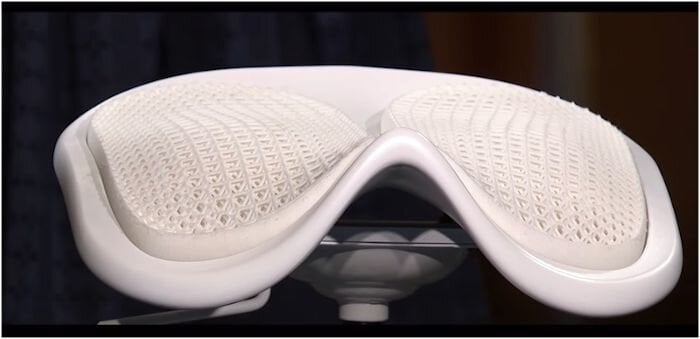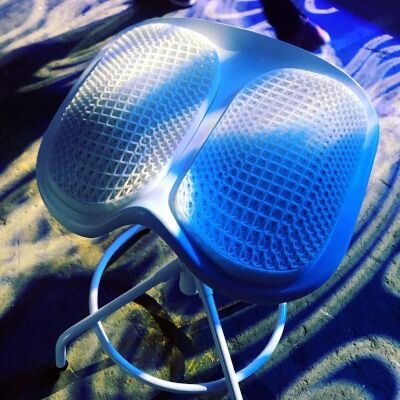
Charles Goulding and Preeti Sulibhavi look at the potential for 3D printed designs in gaming chairs.
There are more than 2.5 billion people who play video games worldwide. There are two main factors in being a good gamer: inherent skill and time devoted to gaming to improve those skills. The time spent becoming a better gamer can often mean hours upon hours sitting in a chair.
This is where ergonomics now becomes an equally important factor in becoming a better gamer. This is a market set to grow at an annual rate of 30% over the next few years, compared with 5% to 10% for standard office chairs. Blake Zalcberg, general manager of gaming-chair brand Respawn Products estimates that the industry will end 2019 with roughly US$400M in sales.
If there was ever a market to tap, it would appear to be the gaming market. This should sit very well with the 3D printing industry as gaming chairs, and their ergonomic designs would be best developed through 3D printing. With the flexibility, durability and light-weight designs that 3D printing offers, the two industries appear to be a perfect fit.
A New Way to Play
Several companies have seized the opportunity to tap into this burgeoning market. In fact, traditional workplace-furniture companies, Such as OFM LLC in North Carolina, are now offering several styles of gaming chairs. These chairs have outlasting, high-performance and customizable features that appeal to gamers who spend countless hours in these chairs.
Some even tout the ergonomic gaming chair industry as the new beginning of the future of ergonomic furnishings in general. While there are some critics who question the comfort and durability of these chairs, the competition continues to grow.
According to the co-founder of Singapore-based gaming chair company, Secretlab, “gamers are a hugely social and discerning bunch.” To appeal to and develop a loyal customer base, Secretlab offers a patent-pending foam for support features that sets its gaming chairs apart.
Design Computation Lab (DCL) is a new research laboratory at The Bartlett School of Architecture, University College London (UCL) developing design methods for the utilization of computational technologies in architectural design, fabrication, and assembly. Design Computation Lab has cross-faculty partnerships in The Institute for Digital Innovation in the Built Environment, UCL and The School of Construction + Project Management, UCL. Chairs are already being 3D printed. Perhaps not so much for gaming at the moment, but for unique design, specific and customizable features as well as durability. Design Computation Lab UCL has various chair projects that feature such designs.
At this time, IKEA offers 3D printed, ergonomic gaming chairs in its stores. In fact, UNYQ has been working with IKEA to be at the forefront of accessibility and affordability of ergonomic designs and concepts. In designing and developing these ergonomic, customizable chairs, and utilizing 3D printing, companies can also benefit from tax incentives that reward innovation and technology.

The Research & Development Tax Credit
Enacted in 1981, the now permanent Federal Research and Development (R&D) Tax Credit allows a credit that typically ranges from 4%-7% of eligible spending for new and improved products and processes. Qualified research must meet the following four criteria:
-
Must be technological in nature
-
Must be a component of the taxpayer’s business
-
Must represent R&D in the experimental sense and generally includes all such costs related to the development or improvement of a product or process
-
Must eliminate uncertainty through a process of experimentation that considers one or more alternative
Eligible costs include US employee wages, cost of supplies consumed in the R&D process, cost of pre-production testing, US contract research expenses, and certain costs associated with developing a patent.
On December 18, 2015, President Obama signed the PATH Act, making the R&D Tax Credit permanent. Since 2016, the R&D credit can be used to offset Alternative Minimum Tax (AMT) or companies with revenue below $50MM and, startup businesses can obtain up to $250,000 per year in cash rebates that can be applied directly to payroll taxes.
On Top of Their Game
Companies that offer workplace/office furniture are now testing the gaming chair market. Raynor Group Companies, located in West Hempstead, New York, is now introducing four new chairs featuring Tempur-Pedic technology (one of their licensed partners). The hope is that the comfort offered will sit well with gamers.
The 3D printing community is certainly familiar with furniture design in general. In fact, gaming chairs would only be an advanced market to tap into, as Millennials have already been demonstrating a demand for customizable, unique 3D printed furniture pieces (i.e. tables, desks, chairs, etc.). In this fast-paced market, it is important for both gamers, and the 3D printing industry to keep up with the demand for these ergonomic chairs.

